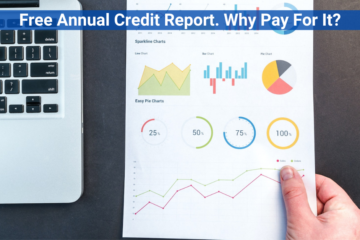To improve credit rating, checking your credit report first gives you a clear understanding of what went wrong. Hence, financial institutions check it first before allowing you to qualify for credit or loans.
But before we discover the steps to improve your credit rating, knowing the basics is a must.
What is a Credit Report?
A credit report is a detailed summary of all your credit transactions, indicating the factors affecting your credit score.
Credit bureaus prepare annual credit reports to help inform lenders and make purchases through credit easy, fast, and safe for borrowers.
What Information is Enclosed in Your Credit Report?
Aside from showing your credit history, it also includes the following information:
- Your personal information (name, age, and address)
- Your employer and job, which consists of the number of years being employed
- Your closed and existing credit accounts, such as mortgages, loans, and credit cards
- Your payment history
What Are the Main Credit Bureaus in Canada?
The following are two main credit reporting agencies in Canada:
These two private companies serve as a library. Hence, they collect and store the same information about your credit history and pull it into one document: your credit report.
Note that neither of the two is considered more accurate than the other.
What is a Credit Score?
It is your credit score that lenders look at for you to qualify for credit or loans. The basic definition of credit score is as follows:
- The numerical representation of your credit files.
- Typically presented by credit bureaus through your credit report.
- Shows your level of creditworthiness based on your credit history.
- It gives lenders an idea if you are likely to repay the loan they make.
The credit score range below helps illustrate which bracket your credit score falls at.
- 760+ (Excellent)
- 759 – 725 (Very Good)
- 660 – 724 (Good)
- 659 – 560 (Fair)
- 559 and below (Bad)
Thus,
- An excellent credit score indicates a reliable credit history.
- It includes positive attitudes like paying on time and responsible credit usage.
Meanwhile,
- A bad credit score shows that a borrower could be a risky investment for the lenders.
- This is due to delays in payments and extended usage of credit.
Basis Of Calculating Your Credit Score
Basically, credit bureaus use your credit history to calculate your credit score. It could be between 300 to 900, depending on your credit performance. The higher your credit score, the better.
Credit-reporting agencies use the following factors below, which affect your credit rating:
-
Payment history (35%)
Undoubtedly, the most critical factor in calculating your credit score. Except for mortgage payments, lenders automatically report every time you make payments to your credit card, personal line of credit, auto loan, and others.
-
Amount Owed (30%)
The second determining factor affecting your credit score is your credit usage. Exceeding your credit limit or using up to more than 60% of it would negatively affect your credit rating. However, using up to 30% or less would positively impact your credit score.
-
Length of Credit History (15%)
In this case, building your credit for a long time will give lenders a picture of how responsible you are in using your credit.
-
Types of Credit Used (10%)
Different types of credit, such as credit cards, loans, and mortgages, enable the lenders to see how you manage them. Shifting your focus on handling your credit will ensure your percentage score in this department.
-
Application of New Credit (10%)
Though applying for multiple credits signifies financial difficulty, this part of your credit score indicates whether you are trying to repair your credit following previous payment troubles.
The factors enumerated above are the most significant ones in calculating your credit score. However, some lenders also consider your income, your employment history, and the reason why you are applying for credit,
How Do You Improve Your Credit Rating?
Here are the following tips to help you increase your credit standing:
-
Review Your Credit Report
Examining your credit report is the first step in improving your credit standing. Thus,
- It allows you to verify whether there are inaccurate data in your report.
- It helps you check if there are any outstanding balances or accounts.
- It lets you examine the negative information before paying as many debts as possible.
-
Timely Payment
Consistently paying on time whenever possible improves your credit rating within a few months. Paying more than once a month also increases your credit score.
-
Contact Your Lender
Setting up an immediate payment plan with your lender after missed payments can lessen its negative impact on your credit score.
-
Use Credit Wisely
Credit usage of more than 60% or up to its limit can negatively affect your rating, and using at least 30% of it is advisable. Apart from overspending, increasing your credit limit can be an option.
-
Limit New Accounts’ Application
Applying for a new credit line also means inquiring about new credit.
It is normal to apply for new credit from time to time, but you must be careful because lenders might think:
- You are living beyond your means.
- You are urgently trying to seek credit.
-
Increase Your Credit History
The longer your credit account is open, the better it will help increase your credit score. Thus, keeping your old accounts active is essential because it helps maintain the length of your credit history.
-
Ask Assistance From Credit Repair Companies
There are credit repair issues that are complicated to understand. And we need credit experts to help us analyze and discuss the problems we have with our credit report.
Thus, credit repair companies can help us with that.
What Are Credit Repair Companies?
Credit repair companies are private institutions’ experts helping borrowers throughout their credit repair journey.
They provide assistance by:
- Helping you understand and analyze your credit report
- Filing disputes to credit bureaus and lenders in case of inaccurate credit report information
- Knowing the processes to take can quickly help you improve your credit rating
How Long Does It Take To Improve My Credit Rating?
Typically, for some minor credit repair, it would take at least 3-6 months to practice good credit behavior. Credit repair varies on your current credit situation. It takes some time to repair a bad credit than to build a good one.
Final Thoughts
In conclusion, credit repair cannot be done overnight; fixing it takes time, patience, and effort. Keeping in mind the things to do and avoid for credit repair will increase your credit score faster. Furthermore, getting help from credit repair companies will make your credit repair journey easier.




